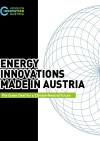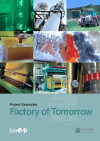Suchergebnisse für "Factsheet: Energietechnologien gestalten, die für alle sinnvoll und nutzbar sind"
Heat islands Feldbach - Synergetic measures against overheating and heavy rain in preparation for an R&D&I project in Feldbach
Analysis and evaluation of the effects and cost-benefit ratios of synergetic measures with regard to overheating and heavy rain in cities. Based on this, an implementation plan will be developed for a subsequent demonstration in Feldbach, which can be used in many similar cities.
Energy Innovations made in Austria - The Green Deal for a Climate-Neutral Future

This brochure presents the latest findings in energy research in Austria with examples from cities of tomorrow, decarbonisation of industry, digital transformation and green hydrogen.
Herausgeber: Bundesministerium für Klimaschutz, Umwelt, Energie, Mobilität, Innovation und Technologie (BMK), Klima- und Energiefonds, June 2020
Englisch, 36 Seiten
Downloads zur Publikation
Fair market conditions for virtual power plants
Analysis of technical, economical and regulatory conditions to get fair terms under competition in the liberalised market for virtual power plants on renewable energy basis.
PDCA4Future - Feasibility Study for a Climate-Resilient Urban District in Bruck an der Mur through a New Planning and Financing Approach
Using the Hannes-Bammer-Sports Hall as a case study, the PDCA4Future feasibility project in Bruck an der Mur aims to develop an innovative planning and assessment tool. This involves creating renovation and financing models that align climate neutrality goals with sustainable urban planning. The objective is a fact-based and replicable investment decision (renovation vs. new construction).
IMPACT – Hybrid hydraulic and electric charging of stratified compact hot water
The IMPACT project is developing an innovative decentralised hot water storage technology for large-volume urban housing. Thanks to a novel, flat design, the system enables highly efficient utilisation of renewable energy sources such as heat pumps and photovoltaics. The aim is to create a cost-efficient, sustainable solution for decarbonising water heating that is optimised using intelligent energy management and machine learning methods.
Urban consolidation Lehen - Subproject 8a: project management - documentation - dissemination and quality assurance
The project coordinates several projects in the urban quarter Lehen to ensure increase of energy efficiency and sustainable development. This subproject contains the coordination of the partners and projects in order to reach defined standards of quality, coordination and cooperation with the program "Building of Tomorrow" and other flagship projects as well as the documentation of results.
TRIGOS - CSR pays!
The project analysed selected TRIGOS projects and organisations and further developed assessment approaches for sustainable management accounting and corporate social responsibility. TRIGOS is an award scheme for organisations who combine economic performance with social and environmental responsibility.
INNANET - Practice-oriented concept for implementation of industrial sustainability-networks
On the basis of conventional and recycling-oriented supply-chains and/or -networks a concept for the implementation of industrial sustainability networks will be developed. Together with a taskforce which needs to be founded a pilot implementation will be prepared.
IEA SHC Task 56 - Newsletter 2, November 2016

Schwerpunktthema des Newsletters ist das 2. Expertentreffen in Darmstadt, Zudem wird über eine Session zur Task 56 bei der 12. „Conference on Advanced Building“ in Bern berichtet.
Michaela Mair
Herausgeber: IEA-SHC Programm
Englisch, 2 Seiten
Downloads zur Publikation
IEA SHC Task 56: Newsletter 2 - November 2016

Schwerpunktthema des Newsletters ist das 2. Expertentreffen in Darmstadt. Zudem wird über eine Session zur Task 56 bei der 12. „Conference on Advanced Building“ in Bern berichtet.
Michaela Mair
Herausgeber: IEA-SHC Programm
Englisch, 2 Seiten
Downloads zur Publikation
Investigations on the Fundamental Suitability of Sprayed-on and Plaster-covered hygrothermic active Cellulose-Compact-Soundabsorber

Development of a new kind of spray-on and plastered noise absorber on the basis of cellulose from recycled paper. The absorber system preferably attenuates the low-frequency range, that can usually only be controlled with rather complex systems, and can also be used where conventional absorbers could cause problems due to impermissible water vapour condensation.
Integration of wind energy by load management
Simulation of optimal strategies to integrate wind energy in Austria and Germany under consideration of load management to maximize the resulting CO2-savings.
Integration by Cooperation
The aim of the project was to assess which forms and conditions of interaction can foster the integration of higher shares of distributed generation into the Austrian electricity grid.
Construction Elements and Building Materials for Buildings with High-Level Thermal Insulation - Technology, Building Physics, Ecological Rating, Costs (in Austria)

Catalogue of construction elements for buildings specified according to the passive house standard: proven elements and connections , examined for technical and physical reliability, with evaluated life cycle ecology. Cost assessments (for Austria). Guidelines for building contractors regarding airtightness, etc.
Green Biorefinery - Separation of Proteins from Grass Juice (Green Juice)
Research and development of the technical process to separate protein from grass juice to gain high-protein concentrate for animal feed by ultra-filtration and other separation technologies.
Multi-purpose apparatus for dedusting and ventilation of flue-gas from biomass-fired boilers
The multi-purpose apparatus is cheaper and requires less material and space. Less power consumption because of utilistion of the cyclone vortex in the induced draft fan.
Erfolgreiche Beispiele aus der Programmlinie Fabrik der Zukunft

Herausgeber: Bundesministerium für Verkehr, Innovation und Technologie (BMVIT)
Englisch, 36 Seiten
Downloads zur Publikation
RE-FORM earth - Earth Building for Building Sector Transformation
In order to promote the use of earth, the RE-FORM earth project is creating a planning basis for the construction of structures and buildings containing earth. In order to counter uncertainties regarding the health effects of earth building materials, a comprehensive program is being carried out to investigate radiation exposure and potential pollutants in earth. By erecting a temperature-controlled rammed earth wall in a test room with subsequent measurements, the aim is to determine the extent to which the material can contribute to healthy indoor air due to its moisture-regulating properties and help to balance out energy peaks.
DigiHemp/ Digital technologies for quality assurance and performance enhancement of hemp-based building materials
Development of digital methods for describing, predicting and optimizing the thermal/mechanical properties of composite materials made from bio-based raw materials. Taking into account the complex material morphology as well as the properties of the components for the prediction of building material properties, the overall goal of increasing the use of bio-based building materials shall be achieved.
V-Form – Manufacturing unreinforced vaulted concrete floors with variable pneumatic formworks
V-Form is working on the development of vaulted concrete floors in terms of structural design and building physics, as well as on a new formwork system. Thanks to the efficient shell construction, around 70% CO2eq-emissions can be saved compared to reinforced concrete flat slabs. The reusable and variable pneumatic formwork system aims to enable the economical production of the double-curved concrete shells.
